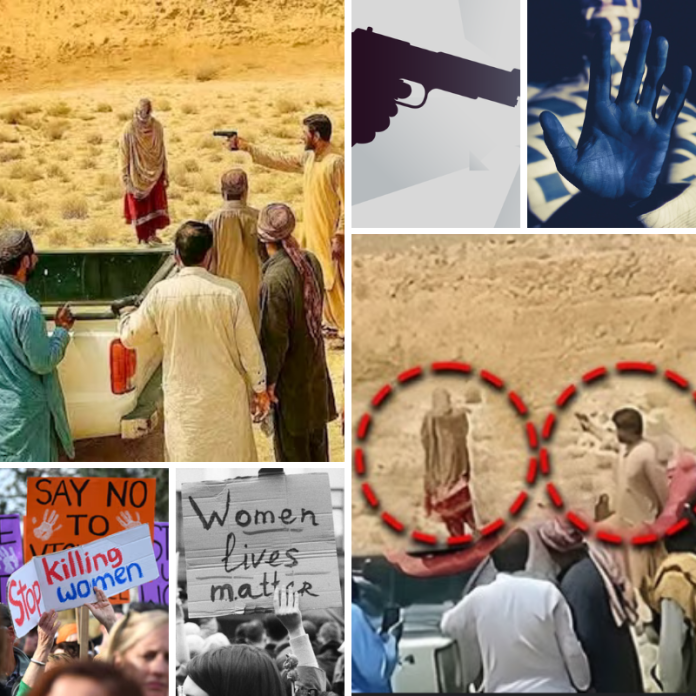A chilling video from Balochistan’s Degari district went viral last week, sending shockwaves across Pakistan. The Balochistan honour killing 2025 video has sparked global attention. The clip allegedly shows a newlywed couple being executed in public reportedly for marrying without family permission. The act, labeled as an “honour killing,” triggered a massive uproar on social media and drew condemnation from political circles. Amid the chaos, the Punjab Assembly has joined voices demanding justice.
What Happened in Balochistan Honour Killing 2025 Case?
-
The video, widely shared on TikTok and Twitter, shows a tribal council announcing judgment before a young woman and man are shot dead.
-
The couple Bano Bibi and Ahsan Ullah were married legally but reportedly eloped against tribal customs.
-
According to reports, the killings were ordered by a local tribal elder, Sardar Satakzai, who believed the couple brought “dishonor” to their community.
-
Authorities in Balochistan have arrested 14 individuals, including tribal leaders, and promised a full investigation.
-
The Prime Minister of Pakistan has personally called for justice and ordered swift legal action.
Balochistan and Punjab Assemblies Reactions
Balochistan Assembly’s Resolution
- Promising parliamentary oversight on the investigationOn July 23, 2025, the
- Balochistan Assembly unanimously passed a joint condemnation resolution.
- Asserting that only the State has the right to deliver justice, not individuals or tribe
-
Declaring the killings as against human rights and Islamic values
-
All parties including opposition stood united on this issue, which is rare in provincial politics.
Punjab’s Stance
-
While the Punjab Assembly has not passed an official resolution specific to this case (as of now), several Punjab MPAs and senators have publicly condemned the killings.
-
Social media pressure has urged Punjab’s lawmakers to table a resolution of their own.
-
Nationally, the Senate of Pakistan and PM Shehbaz Sharif have taken strong notice of the incident.
Public Reaction: Social Media is on Fire
-
Twitter saw trending hashtags like #JusticeForBano, #StopHonorKillings, and #GhairatNahiZulmHai.
-
Popular influencers, feminists, and legal experts called out tribal justice systems and questioned the silence of mainstream media.
-
The Human Rights Commission of Pakistan (HRCP) reminded the public that over 405 honour killings were reported in 2024 alone, with likely many more going unreported.
Youth voices led the charge: short videos, reels, and TikToks spoke out against “feudal traditions that cost women their lives.”
Flashback: A Pattern of Honour Killings in Pakistan
This isn’t the first time a woman has been murdered in the name of “honour”:
Qandeel Baloch (2016):
A social media star murdered by her brother for being “too bold.” Her case sparked global outrage but also showcased how families often forgive the killer, allowing them to escape punishment.
Afzal Kohistani (2019):
He exposed a fake “honour killing” case in Kohistan. He was later assassinated for whistleblowing.
Sana Yousuf (2025):
A 17-year-old TikToker was shot dead in Islamabad earlier this year after rejecting a forced marriage proposal. Justice remains pending.
These stories follow the same thread a woman makes a choice—society punishes her.
Why Is ‘Ghairat’ Still an Excuse for Murder in 2025?
Despite Pakistan having laws against honour killings, the mindset remains alive:
-
Tribal customs override State law in many rural areas.
-
Weak law enforcement and fear of local lords prevent families from seeking justice.
-
The concept of “ghairat” (honour) is still tied to a woman’s behavior, making her an easy scapegoat.
-
Forgiveness loopholes in law allow killers to walk free if the victim’s family pardons them—which often happens under pressure.
“The real problem isn’t just the law. It’s the society that sees women as property and honour as a male asset.” — anonymous human rights lawyer
Bano Bibi’s Last Words
In her final moments, Bano Bibi spoke not in fear, but in unwavering courage. In the Balochistan honour killing 2025 case, Bano Bibi’s final words shook the nation. As she held the Quran in the Baloch wilderness, she addressed the tribal men in Brahvi “Nikkah kiya hai Zina nhi kiya“
These chilling words echoed across Pakistan, becoming a rallying cry for justice. Civil rights activists described her voice as “humbling and remarkable,” highlighting how she “neither begged for her life nor showed any weakness” Voice of Pakistan Minority+1www.ndtv.com+1AP News. The quoted line strips away any myth of “honour” in her killing—it was not a plea but a stand for dignity.
Bano Bibi’s final act is not just as a tragedy, but as a symbol of defiance. Her words remind us how deeply entrenched patriarchy and feudal control remain. “You are allowed only to shoot me. Nothing more than that” resound in every call for legal reform, and fuel movements demanding an end to injustice cloaked in culture.
Stop Killing Women
We cannot let another Bano Bibi become a hashtag. Here’s what needs to happen now:
- Public awareness campaigns in local languages to change perceptions of “honour”
- Immediate legal reform to eliminate forgiveness loopholes for honour crimes
- Digital activism: Continue trending, posting, and exposing injustices
- Pressure politicians: Demand that your local MPA/Minister votes for gender justice
- Support survivors and NGOs: Donate, volunteer, or simply amplify their voice
This article is more than a report. It’s a wake-up call. Because if a woman in 2025 can’t even choose her life partner without risking death, then we are not just behind in justice we are failing as a society. Until society stops romanticizing the word “ghairat” and starts treating women as equals, Bano Bibi won’t be the last—but she can still be a turning point. If we let her.


